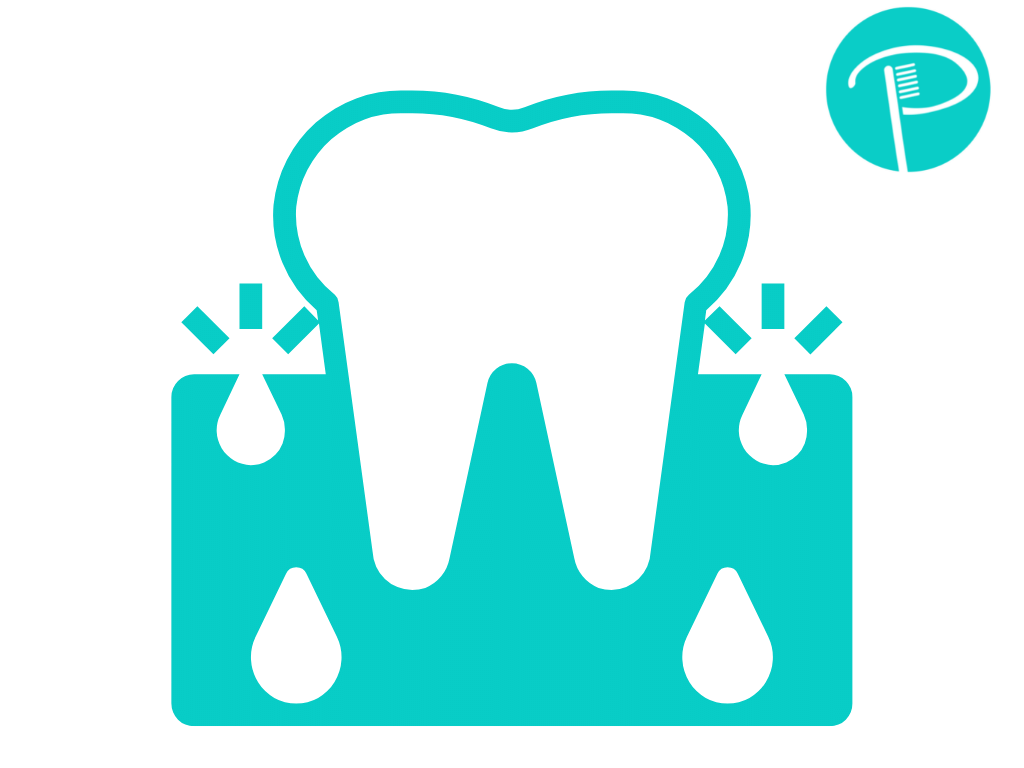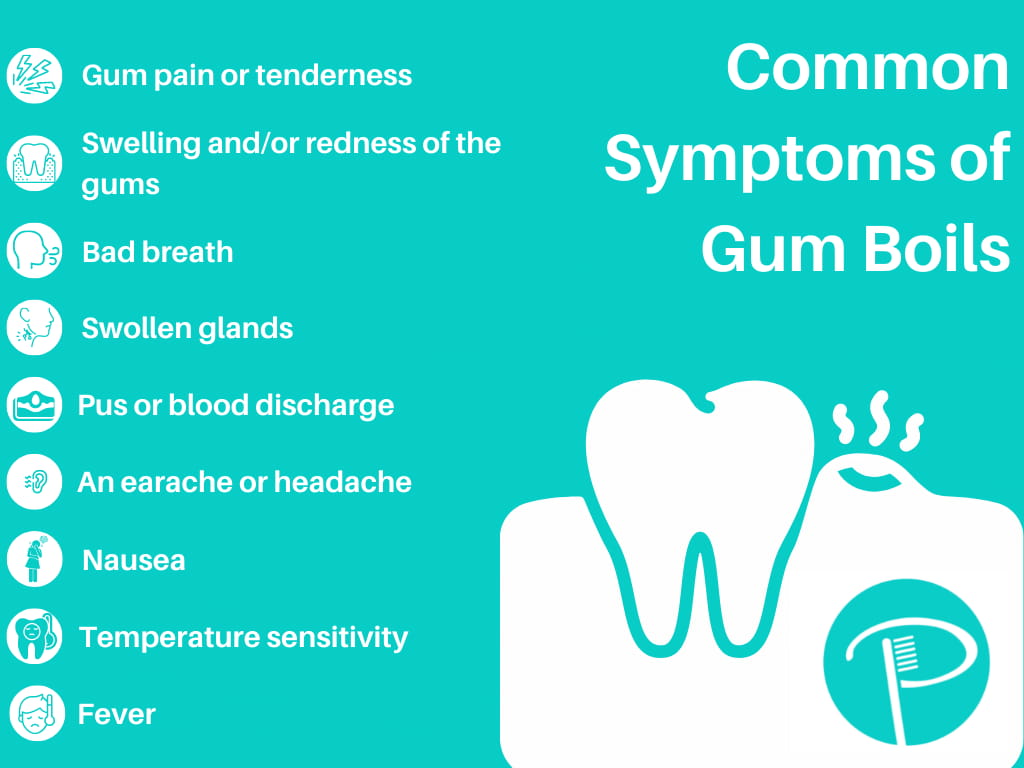Gum Boil Explained

Do you have a painful lump on the lining of your gums? It can be shocking to have a boil manifest in your mouth suddenly, but the good news is that gum boils can be treated with updated teeth hygiene and a little help from your dentist.
What is a Gum Boil?
Also known as an abscess, a gum boil is a swollen lump that develops on your gums. Poor dental hygiene allows for food particles, plaque and decay to build up, creating the infection that forms a boil.
While finding a lump in your mouth can be concerning, it is rarely a symptom of oral cancer. The boils generally do not come with the numbness or painful swallowing that cancer does and can be categorised by where they grow on the gums.
The types of gum boils are defined as:
- Gingival abscess: found along the gum line
- Periapical abscess: at the root of a tooth
- Periodontal abscess: grows around the supporting tissues of the teeth
What Does a Gum Boil Look Like?
Gum boils are a swelling or tissue overgrowth in the mouth, meaning they look like the gum is ballooning out. These boils can be solid gum tissue or filled with pus, meaning that they can be both hard or fluid. The inflammation of the gums can make the affected area red.
Although these boils can be painless, touching them often causes a sharp pain. They can also cause difficulty or pain when eating.
Common Symptoms of Gum Boils
Beyond their appearance, some of the more common symptoms of gum boils include:
- Gum pain or tenderness
- Swelling and/or redness of the gums
- Bad breath
- Swollen glands
- Pus or blood discharge
- An earache or headache
- Nausea
- Temperature sensitivity
- Fever

Are Gum Boils Serious?
A gum abscess is never something to take lightly, as it is a clear sign your teeth have a serious infection. The infection will spread to other teeth without treatment and cause severe dental issues. Bacterial infections are also known to cause bone erosion if left long enough, meaning you could lose teeth.
Luckily, it is rare for tooth decay to occur, as a dental abscess is not difficult to address if treated early on. The most important part is knowing what has caused gum boils, especially as the buildup of bad bacteria cannot always be resolved by better oral hygiene.
If the issue persists after treatment, it is best to talk to your doctor.
What Causes Gum Boils?
While anyone can get a gum boil, those at the most risk include those who are not practising good oral hygiene, smoking or consuming sugary foods in excess. These causes can be embellished further as:
- Poor nutrition: Processed foods and sugary drinks, when consumed in excess, can cause a gum infection. This can lead to a boil forming if your oral health is lacking.
- Smoking: Cigarettes damage your teeth over time and lower your immune system, allowing boils to form.
- Gum disease: If you are already experiencing gum disease, you are at a greater risk of forming boils. This is due to the pockets in your gums formed by the disease, allowing food and plaque buildup to cause an infection.
- Tooth decay: The dying nerves can cause an infection if you have decayed enamel.
- Pre-existing oral issues: Those who already deal with periodontal disease, mouth ulcers, bacterial infections, or have a weak immune system are more likely to have a gum boil form.
Do Gum Boils Go Away?
A gum boil can go away if you treat it promptly. If you leave it untreated, the pain and severity of the dental abscess will only grow. While this can cause tooth decay as the infection spreads, completely ignoring the issue for some time can have deadly consequences.
A bacterial infection, if left untreated, can spread to other parts of the body. This means that an untreated mouth abscess can spread via the bloodstream or bones to other more vulnerable body parts, a life-threatening conclusion to a simply treated issue.
How Do You Get Rid of a Gum Boil?
There are various methods to getting rid of a gum boil, all depending on the severity of the issue and whether or not it can be treated early on. Although a dentist should always treat dental abscesses, there are home remedies that some people swear by.
Home Remedies for Gum Boils
Unhealthy gums are believed to be treatable through easily applicable home remedies. Such as:
- Rinsing your mouth with warm salt water or garlic juice
- Applying tea tree oil or clove oil to the affected area
- Using essential oils as a form of topical treatments
- Antibiotics prescribed by a doctor
However, most of these methods are not medically reviewed and can actually lead to further infection in some cases. The best home remedy is thorough oral hygiene: using an electric toothbrush, floss, occasional mouthwash, and even a careful application of hydrogen peroxide.
Gum Boils Treatment
It is much safer and more advisable to go to a professional for treatment of a gum boil. Since the infection is a sign of an issue in the root canal, or the gum tissue health, this can mean that the antibiotics a doctor can prescribe may not be enough.
In these cases, the affected area should be treated professionally through these methods:
- Deep cleaning: Going into your dentist as soon as you notice the gum boil and getting a deep cleaning is a common and effective treatment. This cleans out the active bacteria harming your teeth and gums, allowing for continuous gum healing.
- Drainage or gum surgery: Cleaning is often followed by dental draining, which removes the fluid buildup in the abscess. If the boil is particularly bad, surgery may be needed to remove it.
- Root canal therapy: If the issue lies in your canal, you can choose to get root canal treatment. This means the removal of any bacterial infection or decay from the affected tooth. A crown can be placed over the canal to prevent further infection.
If you are not sure if you are dealing with issues in the tooth root or along the gum lining, it is best to see a dental hygienist to figure out what dental procedures are best to treat your boils.
How to Prevent Gum Boils
The best preventative care is avoiding unhealthy habits like smoking and maintaining good oral hygiene. Routinely brushing twice a day, flossing at least once, and using an antibacterial mouthwash, makes it incredibly difficult for a gum boil to form.
Otherwise, if you are experiencing any dental issues, you should seek treatment immediately to prevent any chance of infection. You can schedule regular dental check-ups at your local dentist to ensure that a boil has no chance to form.
Our team at Putney Dental Care cares about your dental health, including preventing a bad case of gum boils. If you want to ensure that your gums are as healthy as possible, we are just one call away at (02) 9808 2588, or you can contact us online.
FAQs
Can You Pop a Gum Boil?
You can, but it is not advised. Popping a gum boil of your own accord without any professional cleaning can spread the infection. The pus and fluids released by the popping may get into other vulnerable areas of your mouth, allowing for more boils to form.
Will a Gum Boil Pop on its Own?
Sometimes, a gum boil may decide to pop without much interference. This usually occurs when the boil comes to a head and can be encouraged through salt water rinsing.
Are Gum Boils Hard or Soft?
Gum boils can be both hard and soft. It depends on the tension of the skin caused by how much pus is filling the abscess. Additionally, if the boil is formed by solid fibrous gum tissue, the boil will most likely only be hard.
Whitening with Braces: What to Consider Root Canal vs ExtractionLatest from the Dental Blog
 15 Nov 2017
15 Nov 2017
When Should You Get Your Wisdom Teeth Removed?
There are many possible complications associated with having impacted wisdom teeth. However, it’s also possible for wisdom teeth to propose no…
 05 Jun 2023
05 Jun 2023
How to Stop Wisdom Teeth Pain
The sensation of our last teeth breaking through the gums can be a surprise to many as not everyone has…
 05 Apr 2017
05 Apr 2017
Protect your teeth against cavities this Easter holiday
When was the last time you really brushed your teeth? Do you have a diet high in sugar and starches?…
